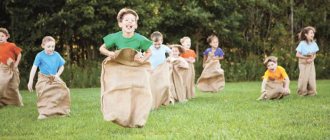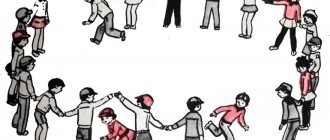It's exciting to watch children play outdoor games. Your own childhood memories flash in your body, you want to run too, join the general game. But outdoor games are not only entertainment, they are incredibly useful and vital for a growing person.
The modern world for a child with a sedentary load at school, in clubs and at home, with gadgets, Zooms, messengers, is incredibly static. Outdoor games for schoolchildren are like air. Children have a powerful reserve of strength inside them and a desire to move. And in order to focus on mental work, the child needs to run around and play enough. Hormonal maturation with its energy surges has also not been canceled. Movement gives a teenager the opportunity to feel confident in their body, despite the changes occurring to it. Helps you accept your own body, this is important both in childhood and in the context of future life.
In the game, movement is realized most creatively. An outdoor game trains flexibility, dexterity, teaches you to maintain balance, concentrate attention, regulate the accuracy of movement, and quickly and non-trivially solve bodily problems. The game relieves muscle tension, reveals the ability to improvise, recharges the head, develops sensitivity, trains active response and relieves stress. The game is a mass training. In the game, the child receives tactile and emotional communication. Body contact not only with other children, but also internal contact with your body. The game is a very social thing. There is a lot of role-playing in outdoor games for children: they play out conflicts from real life and this helps not only to see them from a different angle, but also to solve problems outside the game, cope with them using gaming experience, and find an environmentally friendly way out of the conflict.
The top games that children of different generations love to play, here they are:
Ali Baba
Children are divided into two teams and stand holding hands, facing each other. The distance between them is approximately 6 meters. The older the children, the greater the distance may be. One team shouts: “Ali Baba!” The second replies: “About what, servant?” The first one answered them: “Fifth or tenth, Petya is here for us!” The child named from the opposite team runs as fast as he can towards the opponents’ wall, breaking the chain with himself. Broke - takes someone from this chain to his team, usually someone he sympathizes with. If not broken, the enemy joins the formation. The game continues until one child remains on one side.
Outdoor games
Outdoor games
Outdoor games are one of the ways to develop a child physically. They allow you to relieve physical fatigue from your muscles and achieve an emotional switch from one type of activity to another. Outdoor games are especially loved by children, because they are an important source of joyful emotions. Games stimulate active work, thoughts, help broaden one's horizons and improve all mental processes. Outdoor games form positive moral qualities in children. Kindness, mutual assistance, support, courage, attentiveness, mutual assistance are highly valued among the players, and qualities such as cowardice, selfishness, and boasting are condemned. Most often, outdoor play begins with the choice of a leader. In some games, everyone wants to drive, and in some games, no one wants to drive. Therefore, we suggest choosing a leader using counting rhymes. To do this, the participants in the game must stand in a circle, and one person will begin to recite the counting rhyme. Each participant has to pronounce a word or syllable. The one who has to say the last word (syllable) of the counting rhyme will become the leader.
Competitions can be held in outdoor games, as well as in sports ones. The simplest of them are competitions and attractions organized during the holidays or regardless of this. A more complex type of competition is a championship between several teams in one of the outdoor games, such as, for example, “Shootout”, “Ball for the Catcher”, “Circular Lapta”, “Pioneerball”, “Russian Lapta”, “Pioner Lapta”. Competitions in outdoor games help to develop children's organization and collectivism, honesty and the will to win. They contribute to the education of organizers - the leaders of games, and the introduction of games into everyday life.
Without detracting from the importance of competitions in individual games, it is important to note that the most valuable from a pedagogical point of view are competitions in a set of outdoor games, such as “Fun Starts”, “Sportlandia”, “Do with us!”, “Sports Family”, etc.
The complex includes outdoor games with a variety of motor actions, various technical and tactical actions that require the manifestation of various skills and moral and volitional qualities. Such competitions (where, along with children, adults often also participate: parents, counselors) require participants to be fully prepared and, in turn, contribute to their physical development.
If children of different ages participate in competitions, then tasks and games must correspond to their age characteristics and physical development. The different interests and physical abilities of boys and girls, especially teenagers, are also taken into account.
You can use different games (there can be 6-10 of them in total) for boys and girls, or combine them in one team, which usually consists of 10 people (which is pedagogically more valuable), but give them different tasks. So, boys in a relay race, for example, lead the ball with their feet, and girls hit the ground with their hands. If children of different ages participate in the relay race, then the younger ones are given easier tasks. In the same relay race (stages) there may be different tasks, but they must be the same for each team.
Competitions are held on a round-robin basis, where each of, for example, four teams plays with each other, trying to score more points. Competitions can also be held according to the Olympic system, where the losing team is eliminated. Consolation games can be played with eliminated teams. For winning each game, the team receives the number of points established by regulation. For example, 3 points for a win, 2 points for a draw and 1 point for a loss. Typically, the complex competition program takes 1-1.5 hours. Competitions in outdoor games can be held all year round: in the gym, on the playground, on the skating rink, on the snow playground. The selection of outdoor games also depends on the time of year and conditions.
Outdoor games contribute to team unification, mass participation of children in physical exercise, and are a wonderful means of comprehensive physical development.
And further. Outdoor games can also become a means of leading up to the sports games that children love so much.
But just the desire to play and knowledge of games is not enough. It is still necessary to convey them to the children, with knowledge of the matter, sometimes carefully reveal the content, arouse interest in them. Otherwise, even the most exciting game may be rejected. Apparently, this forces some counselors to follow the path of least resistance, that is, to “drive” football. Here, they say, everything is clear to the guys. And if the pioneer is weak or has not matured, then let him sit and watch.
The counselor should show due persistence in acquiring the ability to conduct outdoor games for children of different ages, and camp organizers should show instructive classes for counselors.
So, before playing a game, you need to not only know its content well, but also other important points: the age of the children, have an idea about the team, take into account what they did before, where the game will be held (on a walk, in the forest, in the hall or sports field).
Outdoor games always require motor efforts from the players, aimed at achieving a conditional goal specified in the rules. The peculiarity of outdoor games is their competitive, creative, collective nature. They demonstrate the ability to act together with a team in constantly changing conditions. What is the most important thing in organizing such games. Each game has its own game task: “catch”, “catch”, “find”, etc. Try to captivate the children with it and interest them. Sometimes it’s useful to play on the guys’ pride by expressing “doubt” about their strength and dexterity. Draw a vivid picture of the upcoming action in front of the children. At the beginning, you shouldn’t limit yourself to just one routine phrase: “And now we’re going to play...”. When organizing outdoor games, remember that it is better if you are as much a participant in them as the guys. Each game has its own rules. Explain them clearly. This can be done more effectively if, simultaneously with the story, you show actions, i.e. create a figurative idea of the game. Let one of the guys repeat after you what will require special attention in the game. If the rules are not followed during the game, pause the game, make a cheerful commentary on what is happening and show what the mistake is. During the game, be emotional and spontaneous. Cheer the guys up. A comic report about what is happening is also possible. If you lose interest in the game, try complicating the rules, this usually inspires you. But remember: a game is a game as long as it gives the characters a wide range of behaviors, as long as their actions cannot be predicted in advance. Don't miss the moment when it's best to finish the game. And yet, some games require simple equipment, prepare it in advance. Think carefully about where it is best for you to organize the game. Let it be a comfortable and safe place. Often, to play games you need to break into teams; for this, keep a few original rhymes in stock.
- Red, yellow, green
- Digdon
- Weaver
- Catch the Tail
- Trap
- Release of a prisoner
- Scouts and sentry
- Enchanted castle
- Traffic light
- Aram-shim-shim
- Hare without a den
- Santiki-candy wrappers-limpopo
- Hello
- Guess whose voice it is
- Water
- Crows and sparrows
- Proteins, nuts, cones
- Catch the dragon's tail
- Seine
- Cat and mice
- Traps
- Shore and river
- Wolves in the ditch
- Squirrels on a tree
- Counting books
- Wink
- Atoms and molecules
- Dombay boxing
- Mobile relay
- American triangle
- Proteins in cells
- One-two-three, I'm watching
- Groups by attribute
- Mini croquette
- Blinkers
- White bears
- Cones, acorns, nuts
- Third wheel
- Checkboxes
- The Dragon
- Crow Sparrows
- Don't miss the ball
- Forest, swamp, lake
- Chain
- Ball game
- Ticket passengers
- Quickly in a circle
- Jumpers
- Wolves and sheep
- Three, thirteen, thirty
- Snake
- Lying snake
- Pressure points
- Circular transmission
- Changing places
- Amoeba flight
- Loaded
- Mines
- Keep the ball flying
- Hide and seek in reverse
- Burning forest
- Coin tags
- Relay races
- Progressive relay
- Fun starts
- Santiki-candy wrappers-limpompo
- Set of moving competitions
- Dragon head
- Fishing rod
- Golden Gate
- On the wreckage of the ship
- Touch the Shadow
- Scouts and sentry
- Seine
- Trains
- Liberation
- Chase
- Ocean is shaking
- Kondals
- Ball in hand
- Secrets
- Neighbor on the right
- Above your feet from the ground
- Steps
- Traffic light
- Third wheel
- Ogre
- Drive more quietly
- Traffic lights
- Statue
- Cities
- Day and night
- Sick cat
- Brook
- Hat
- Kite and Black-White
- Oh-oh-oh-oh
- Trap
- Tag
- Tag 2
- Ball up
- Flashing lights
- Four forces
- Unusual relay race
- Please
- Sorcerers in the village
- Hunters, animals and fleas
- Third wheel
- Guess whose voice it is
- Water
- Zhmurki
- Cones, nuts, acorns
- Handkerchief
- Cat and mouse
- Catch the dragon's tail
- Chicken and kite
- Networks
- Salki
- Sorcerers
- River, shore
- Wolves in the ditch
- Hide and seek
- 12 sticks
- Swan geese
- Crows and sparrows
- Traffic light
- Drive more quietly
- Elephant
- Enchanted Castle
- Jungle
- Flag
- Snake
- Molecule
- Relay train
- Change zone
- Destroyed camp
- Three jumps
- Sideline pass
- Taking the ball
- Guardsmen and Musketeers
- Invisible
- Chasing foxes
- Diamonds
- Admiral on board
- Set of outdoor games
- Set of outdoor games 2
- Set of outdoor games 3
- Set of outdoor games 4
- Set of outdoor games 5
- Set of outdoor games 6
- Set of outdoor games 7
- Set of outdoor games 8
- Set of outdoor games 9
- Set of outdoor games 10
- Set of outdoor games 11
- Set of outdoor games 12
- Set of outdoor games 13
- Set of outdoor games 14
- Set of outdoor games 15
- Set of outdoor games 16
- Set of outdoor games 17
- Set of outdoor games 18
- Set of outdoor games 19
- Set of outdoor games 20
- Set of outdoor games 21
- Set of outdoor games 22
- Set of outdoor games 23
- Set of outdoor games 24
- Set of outdoor games 25
- Set of outdoor games 26
- Set of outdoor games 27
- Set of outdoor games 28
- Set of outdoor games 29
- Set of outdoor games 30
- chain
- tea-tea help out
- Sherlock Holmes
- water ball
- Collection of outdoor games
- Relay Races-Competitions
- Four steps forward
- Santaky-candy wrappers–limpompo
- Morning exercise
- Durestafeta
- Educational games
- Waves in a circle
- Where where
- Spoon
- Liberation action
- Trial
- Balloon volleyball
- Stop the ball
- Cat and mouse
- Masha and Yasha
- Pursuit - hunting
- Newspaper fight
- Place here
- Sneak up on Bigfoot
- Everyone is connected
- Dangling carriage
- Wolf in a circle
- Ali Baba
- Green heel
- Paints
- Call
- Ghost Hunt
- Tag
- Outdoor games
- Outdoor games 2
- Outdoor games 3
- Outdoor games 4
- Outdoor games 5
- Outdoor games 6
- Outdoor games 7
- Outdoor games 8
- Outdoor games 9
- Outdoor games 10
- Outdoor games 11
- Outdoor games 12
- Outdoor games 13
- Outdoor games 14
- Outdoor games 15
- Outdoor games 16
- Outdoor games 17
- Outdoor games 18
- Outdoor games 19
- Outdoor games 20
- Outdoor games 21
- Outdoor games 22
- Outdoor games 23
- Outdoor games 24
- Outdoor games 25
- Outdoor games 26
- Outdoor games 27
- Outdoor games 28
- Outdoor games 29
- Outdoor games 30
- Outdoor games 31
- Outdoor games 32
- Outdoor games 33
- Outdoor games 34
- Outdoor games 35
- Outdoor games 36
- Outdoor games 37
- Outdoor games 38
- Outdoor games 39
- Outdoor games 40
- Outdoor games 41
- Outdoor games for kids
- Outdoor games for kids 2
- Outdoor games for kids 3
- Outdoor games for kids 4
- Outdoor games for kids 5
- Outdoor games for kids 6
- Outdoor games for kids 7
- Outdoor games for kids 8
- Outdoor games for kids 9
- Outdoor games for kids 10
- For kids “Journey to a Deserted Island”
- Outdoor games for middle age
- Outdoor games for teenagers
- Outdoor games for girls
- Outdoor games for boys
- Group games for boys and girls
- Chains
- Running games
- Games with teams
- Games without division into teams
- Football players
- Football players for boys
- The joy of movement
- Correction of posture disorders
- Folk outdoor games
- Accuracy games
- Catch-up
- Tug games
- Puzzle games
- Step by step
- Tag
- Friendly tags
- Fisherman
- Harnesses with tourniquet
- Guess who spoke
- Water games
- Cool variations of popular sports games
- By the tail of the dragon
- Games for girls and boys
- Mobile competitions for girls
- Brief encyclopedia of outdoor games
- Playground games
- Running games 2
- Jumping games
- Holiday “Journey to the Land of Games”
- Games for children with jumping
- Higher, further
- Agility and climbing
- Endurance games
- Active games for little ones
- Active games for little ones 2
- Active games for little ones 3
- Active games for little ones 4
- Game "Comet"
- Tend coating
- Outdoor games
- Outdoor or gym games
- Outdoor games from our childhood
- Outdoor sports games
- Outdoor sports games 2
- Outdoor sports games 3
- Outdoor sports games 4
- Outdoor sports games 5
- Outdoor sports games 6
- Pirate attack
- Wet Wars
- Collection of games “Taiga”
- Chain breaking games
- Game marathon “Fun in our yard”
- Differentiated games-exercises for younger children
- Mime games for younger children
- Bear fights
- Outdoor games by section
- Outdoor games for young children (7–10 years old)
- Games with resistance from opponents
- Health games
- Glade of fun things to do
- Outdoor and competitive games
- Games for 1 - 2 groups
- Fun outdoor games
- Happy Starts 2
- Games with children on the street
See also
- More about outdoor games
- Children's outdoor games
- Classification of outdoor games
- Organizational issues for conducting outdoor games
- What you need to know when preparing and conducting outdoor games
- Methods of conducting outdoor games with children
Additionally
- Children's outdoor games
- Children's outdoor games 2
- Children's outdoor games 3
- Games on the playground
- Corrective outdoor games for children with developmental disabilities
- Card index of outdoor games for kids
Links
- Section "Active lifestyle" on ooks
- Website about outdoor games on 4cf
- Outdoor games, Zhukov M.N.
Classics
They draw on the asphalt with chalk, or draw figures from squares on the ground with a stick. By jumping on one leg and pushing a pebble with it, children move to the place where it rolled. You cannot step on the line - on the boundaries of the squares. You can alternate legs with each jump. At the end of the figure a cauldron or fire can be drawn; this square cannot be entered. Having reached it, the player must deftly turn over in a jump and start jumping in the opposite direction.
The quieter you go, the further you'll get
The driver stands with his back to the other children at a great distance and says: “You drive more quietly, you will go further, stop.” While he is speaking, other children run towards him, but at the word “stop” they freeze in place. The water turns sharply and notices the one who did not have time to freeze - he is eliminated. The goal is to run to the driver and cross the conventional line on which he stands.
How do games for schoolchildren affect mental development and creativity?
Currently, the curriculum includes not only classical classes, but also gaming ones. Games for schoolchildren are becoming a regular learning activity, and its impact on all-round development has already been proven by numerous studies. During gameplay, schoolchildren develop performance skills, which include inhibitory control (the ability to work without distraction), memory and cognitive flexibility (the ability to adapt to changing working conditions). The skill of execution is extremely important for achieving academic success and career growth.
Games for schoolchildren are an indispensable condition for the development of creative potential and the desire to learn new things. When children's imagination is stimulated during games, children learn a variety of ways to get out of critical situations and problems. The game also gives children the skills of risk and perseverance, which will serve them well in their careers and adult life in general.
Traffic light
Two boundaries are marked in space - like two sides of a street. The water stands in the middle, with its back to the other children remaining on one side. He names a color and turns to face everyone. Those who have this color in their clothes move to the other “side of the street.” Those who are missing run across, and the water catches them. The one caught becomes new water. In this case, you can name any colors, not just those that are in the traffic light.
How do games for schoolchildren affect social development?
When children reach the age of six, their main activity is playing with other children. In the process of playing together, children learn to listen, empathize, and support. They will use these skills in communicating with people throughout their lives.
During the game, students also learn conflict resolution and negotiation skills. Play activities help develop social skills from an early age and ensure that children strive to find common ground with each other and a sense of belonging.
Waves with a skipping rope
One of the most fun games with a jump rope is waves. Two people hold the rope at both ends, twisting it near the ground and gradually lifting it higher, increasing the waves. The rest of the children jump to one side and the other without touching the jump rope. Or they “dive” under the waves. The one who is touched by the jump rope is eliminated from the game.
Tell your child about the games of your childhood, play with him, initiate games among children and their friends. While playing, the child learns to quickly dodge, fall safely, run at full speed and jump with the feeling of flying. The game is about freedom, joy and spontaneity. About an open-minded perception of the world. By playing, a person gets rid of fears and pressures, and the release of energy occurs in the right direction. Outdoor games for children contain a lot of reasons for improvisation. Playing is exciting, exciting, it makes the child more self-confident and helps him feel his freedom of choice, strength and speed, given by nature.
How do games for schoolchildren affect physical development?
Without a doubt, physical activity during sports and other games benefits the developing body. During outdoor games, especially if they take place in the fresh air, blood oxygen saturation increases and metabolism accelerates, which in turn is the prevention of excess weight in children - a pressing problem of our time. Physical activity in the fresh air helps strengthen the immune system and helps expend excess energy, which has a beneficial effect on children’s perseverance and attention during lessons.






